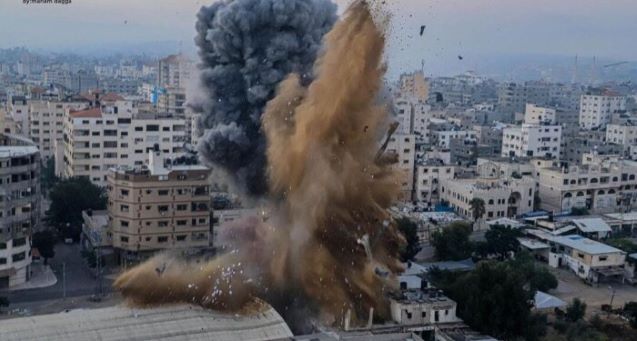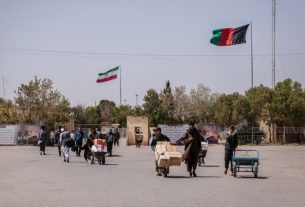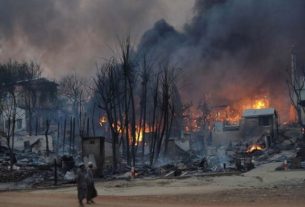Fears have mounted that Israel’s war in Gaza could spread across the region after strikes in Lebanon and Iraq as well as deadly blasts in Iran, but experts say a wider conflict is unlikely for now.
What has happened?
Almost three months into the conflict between Israel and Palestinian militant group Hamas, tensions are high in the region. Neighbouring Lebanon, Hamas and a US official have said Israel was behind an air strike that killed Hamas number two Saleh al-Aruri, 57, in a stronghold of Lebanese group Hezbollah in Beirut on Tuesday.
Israel has not claimed responsibility for the assassination of Aruri, a founder of the military wing of Hamas, but it had accused him of masterminding numerous attacks. Iran, which backs Hamas as well as Hezbollah, has blamed Israel and the United States for twin bomb blasts that Wednesday killed at least 84 people commemorating Revolutionary Guards general Qasem Soleimani killed four years ago in a US strike. A State Department spokesman said any suggestion of US involvement was “ridiculous” and that Washington had “no reason to believe that Israel was involved”.
Iraq and the pro-Iran Hashed al-Shaabi paramilitary group, meanwhile, have blamed the United States for a drone strike that killed one of its military commanders in Baghdad on Thursday. The October 7 attack by Hamas on Israel, the worst in its history, resulted in the deaths of around 1,140 people, mostly civilians, according to an AFP tally based on official Israeli figures. Militants also took around 250 hostages back to the Hamas-ruled Gaza Strip, of whom 129 remain in captivity, according to Israeli figures. After the attack, Israel began a relentless bombardment and ground offensive that has killed more than 22,000 people in Gaza, according to the besieged territory’s health ministry.
War with Lebanon?
Aruri is the most high-profile Hamas figure to be killed since October 7.
If Israel was behind the strike, it would be the first such attack in Beirut since a month-long war between Israel and Hezbollah in 2006. Large swathes of southern Lebanon were destroyed in that conflict, which killed 1,200 Lebanese, most of them civilians, and 160 Israelis, mostly soldiers.
Lebanon’s economy is now in tatters and endless political deadlock has all but stemmed international aid.
Israeli army spokesman Daniel Hagari on Tuesday did not directly comment on Aruri’s killing but said the military was “highly prepared for any scenario”.
Mark Regev, senior advisor to the Israeli Prime Minister Benjamin Netanyahu, said Israel had not taken responsibility for the assassination, but stressed it was “not an attack on the Lebanese state” or Hezbollah.
Hezbollah leader Hassan Nasrallah on Wednesday warned Israel, saying: “If the enemy thinks of waging a war on Lebanon, we will fight without restraint”. The attack was a “major and dangerous crime” which “will not go unanswered and unpunished”. Karim Bitar, professor of international relations at the Saint Joseph University in Beirut, said the strike was “worrying”. “Even if neither Iran nor Hezbollah, nor Israel have any interest in open war, bad calculations, badly calibrated reprisals could lead to a conflagration,” he said. Amal Saad, a scholar of Hezbollah and lecturer at Cardiff University, said “Hezbollah will have to respond in a way that… warns Israel not to repeat it”.
But “it can’t respond in a way that gives Israel no choice but to launch all-out war,” she said, adding Hezbollah would also have to increase security for other Hamas officials in Beirut. Maha Yahya, the director of the Carnegie Middle East Center, said the Lebanese group has so far sought to avoid “a major conflict that will destroy the country”. “The risk of escalation is big but Hezbollah is trying hard to avoid being dragged into a conflict,” she said.
Regional conflict?
Fabrice Balanche, research director at the University of Lyon, said a regional war was unlikely. “The Iranians do not want a confrontation with Israel, and neither does Hezbollah, because they know they will be on the back foot,” he said. “If Israel was attacked by missiles, the Americans would retaliate.”
Instead Iran would likely restrict its response to continuing upsetting maritime trade in the Red Sea, Balanche said. Yemen’s Iran-aligned Huthi rebels have launched more than 20 attacks on merchant ships around the Red Sea’s southern chokepoint at Bab al-Mandeb, disrupting shipping in a waterway that carries about 12 percent of global trade. “The Iranians have to react, but not head-on,” Balanche said. “Closing off Bab al-Mandeb is very costly” for those using this key route, he added.__Daily Times





